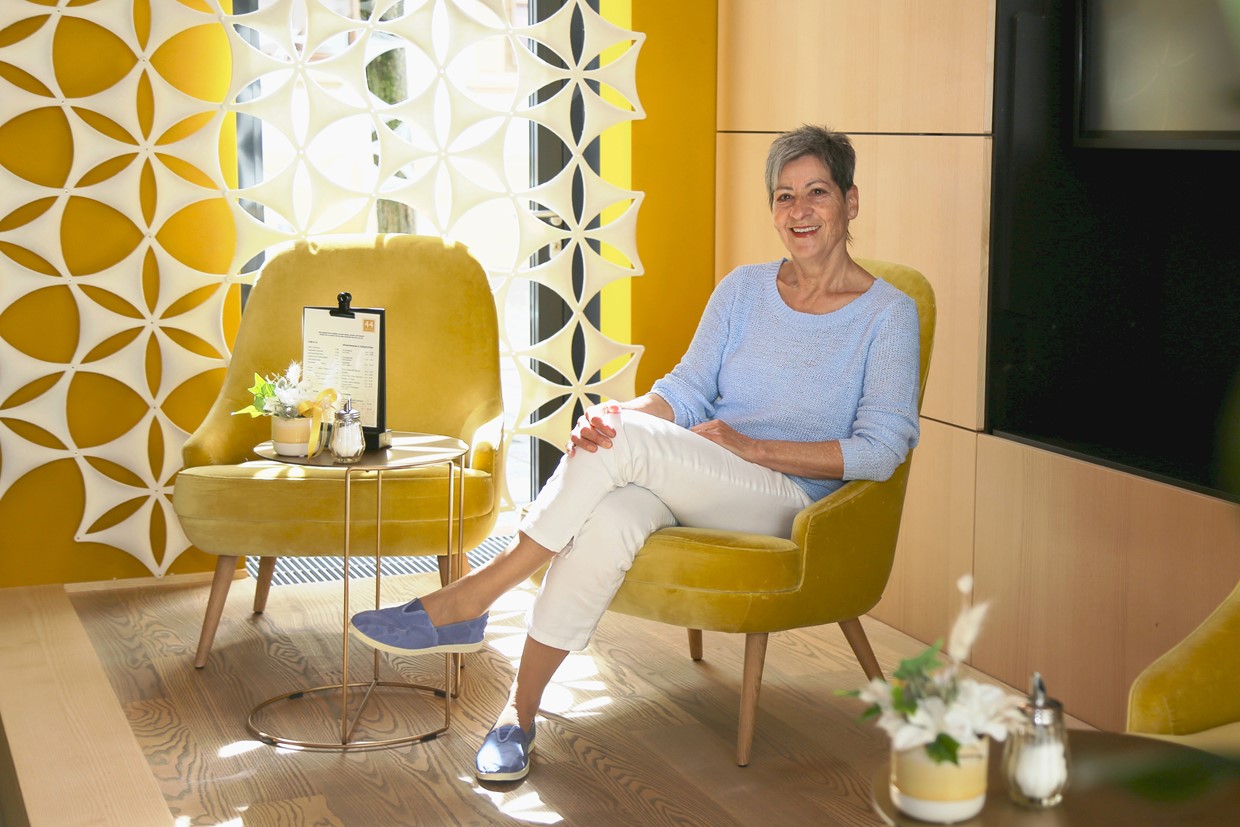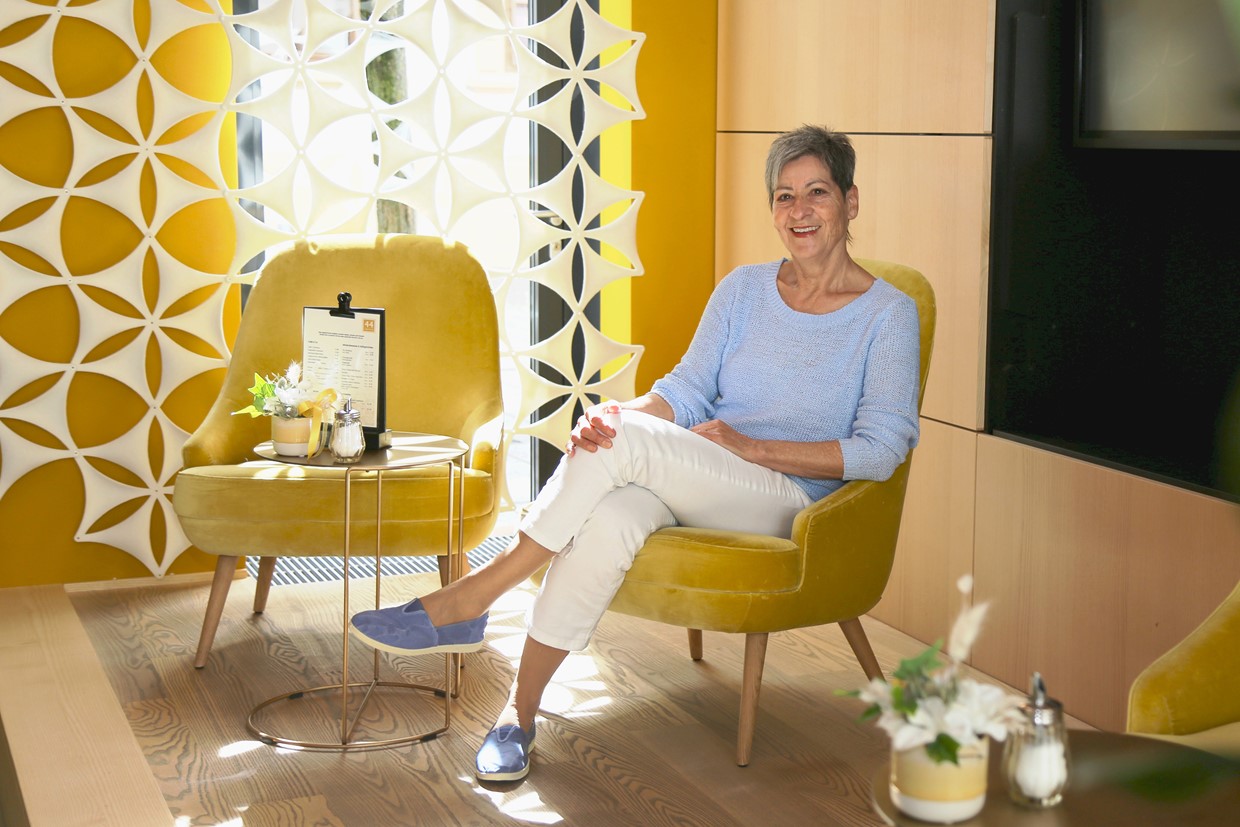Information checkedInformation unaudited Information geprüft Information ungeprüft “Today, I can help. Tomorrow, somebody helps me."


LLBʼs Future Foundation is now helping to fund Zeitvorsorge Liechtenstein, an association providing care for older people. In the course of this funding, we found out that a former LLB employee is actively involved in the associationʼs Zeitpolster project: Cornelia Märki.
Cornelia, you are a retired LLB employee. Please tell us a bit about yourself. How long did you work at LLB? In which business areas? And what are you doing now that youʼre retired?
In 40 years at LLB, I didnʼt just experience one business area (laughs). I started in the loan department, and my last job was with Bruno Schranz in Fund Services. Iʼve been retired for four years now, and I have to say – it feels good! Iʼm enjoying it to the fullest! I still remember my transition to retirement very well. Just doing nothing for a moment. I love the outdoors and enjoy sport, so Iʼm out and about a lot. But after a while, I realised that it would be nice to have a more relaxed responsibility again.
LLBʼs Future Foundation now supports Zeitvorsorge Liechtenstein, where you are an active helper. What exactly is Zeitvorsorge, and what goals does the association pursue?
Zeitvorsorge Liechtenstein – or “Time Provision Liechtenstein” – was founded in 2020 with the aim of counteracting the looming shortage of skilled care personnel through the “Zeitpolster”– or “Time-Cushion” project. With the support of helpers, older people are enabled to stay in their own homes for as long as possible. The idea is for civil society to help itself. In the spirit of: Being active is the best provision. Help today – benefit tomorrow.
What exactly does the Zeitvorsorge project look like?
Many older people live alone and need help with smaller tasks. Even their own children canʼt be expected to do everything these days. The hours I invest now are credited to my “account”, and I can draw on those hours again later in life when I might need help. But even people who donʼt yet have an “account” can also request support and pay a small contribution.
What personal experiences have you had during your time as a volunteer that have had a particular impact?
There have been quite a few. Itʼs incredible how different worlds collide. Sometimes itʼs a person who has dementia and tells you the same thing, full of enthusiasm, thirty times in a row. Or someone who has cancer and I drive them to hospital. They have one thing in common: gratitude – they are all so incredibly grateful – and a desire for company.
I also have very fond memories of people who, sadly, have died in the meantime. Of course, this is something everyone is confronted with at some point. One acquaintance of this kind turned into a friendship, which has now developed into a very special bond with family members. Itʼs a special relationship: You get closer to other people again. Just like in the old days, when you were quick to help your neighbour and a basis of trust developed – in a relaxed, natural way.
What significance does the Zeitpolster project have for the community, and what might possible tasks look like?
There is a very wide range of possible tasks. For example, I like to go for walks with people with dementia, or join them for coffee and cake in a café and have a good time. This is also a relief for the families of those affected. I also do a lot of driving. Many older people are no longer able or allowed to drive. But there are also tasks such as feeding cats, mowing lawns, hanging pictures, or simply providing company. At first I thought to myself, this is a great thing – Iʼm investing now, and when Iʼm older and need help myself, Iʼll receive help in return without feeling guilty. But now I do it simply because I love doing it. People are so welcoming, full of warmth and gratitude.
How is this work received by the public? Whatʼs your impression?
I simply notice a great deal of appreciation from the people I help. Zeitpolster really took off last year. More than 200 helpers spent more than 3,000 hours last year on small and large tasks. More and more people are making use of Zeitpolster – and not just older people.
What role does the support of LLBʼs Future Foundation play for your association?
As an association, we are always happy to receive financial support. All the more given that Zeitpolster would like to continue to get by without public funding. We also receive donations from private individuals and are grateful for any support. This also enables us to organise events for helpers, or training for helpers who care for people with dementia.
And one final question: Do you miss LLB a bit? We heard you still occasionally come for a visit?
To be honest – no (laughs). I can say itʼs a different life, and I enjoy the freedom I now have in retirement. But I still like to pop in for lunch from time to time and visit my former work colleagues. I also meet up with two other former LLB employees every Wednesday. The three of us go on excursions, walk in the Ruggeller Riet, visit a museum, or simply go shopping. My time at LLB has led to friendships that are still part of my life today. Itʼs simply a good feeling.
Future Foundation
LLBʼs public-benefit Future Foundation was established in 2011 to mark the companyʼs 150th anniversary. Its purpose is to fund future-oriented social and environmental projects by individuals and organisations. Funding in the social sphere is awarded especially to projects that provide a sustainable improvement to the living and working conditions of people and that strengthen their individual responsibility. In the environmental sphere, special importance is attached to environmental sustainability. The Future Foundation is also a member of the network of the Association of Liechtenstein Charitable Foundations (VLGS).
Find out more about the Zeitpolster project here: https://www.zeitpolster.com/li/
